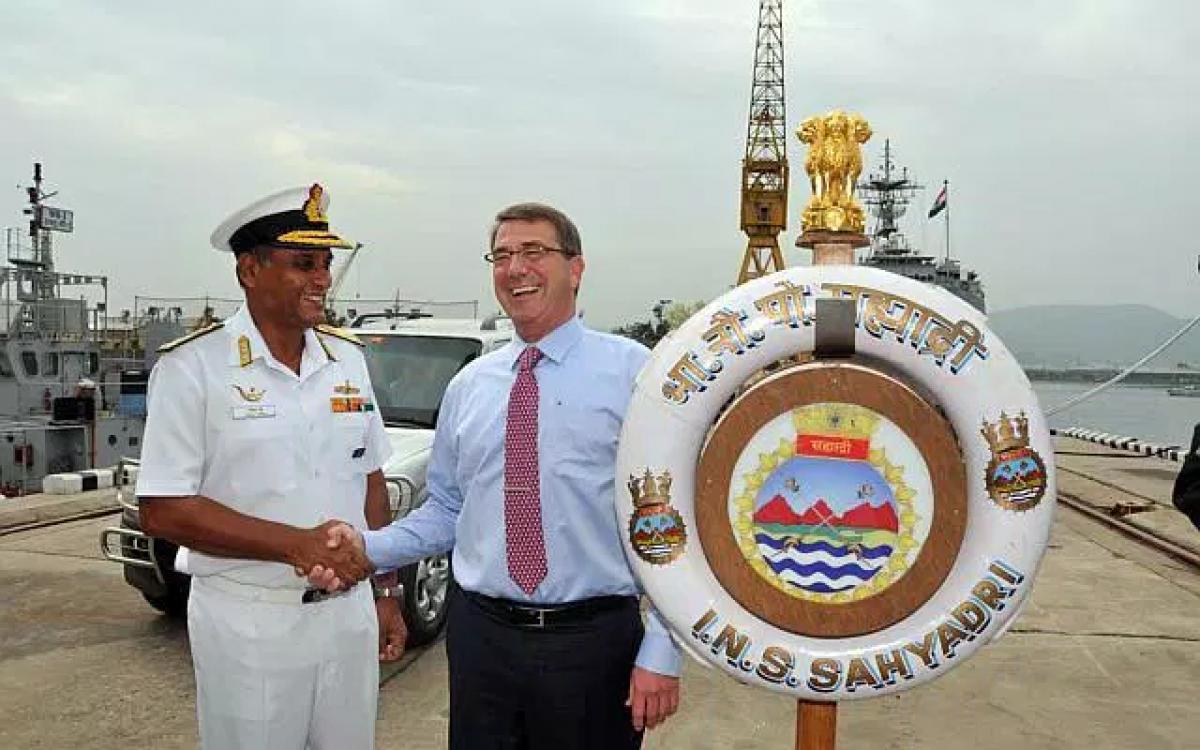Live
- Over 7,600 Syrians return from Turkiye in five days after Assad's downfall: minister
- Delhi BJP leaders stay overnight in 1,194 slum clusters
- Keerthy Suresh and Anthony Thattil Tie the Knot in a Christian Ceremony
- AAP, BJP making false promises to slum dwellers for votes: Delhi Congress
- 'Vere Level Office' Review: A Refreshing Take on Corporate Life with Humor and Heart
- Libya's oil company declares force majeure at key refinery following clashes
- Illegal Rohingyas: BJP seeks Assembly session to implement NRC in Delhi
- Philippines orders full evacuation amid possible volcanic re-eruption
- Government Prioritizes Welfare of the Poor, says Dola Sri Bala Veeranjaneyaswamy
- Two Russian oil tankers with 29 on board damaged due to bad weather
Just In

US eggs on India to be regional power. As if to drive home the importance that the US attaches to India’s “Act East” policy, US Defende Secretary Ashton Carter recently paid a three-day visit to India at the Indian Navy’s Eastern Command in Visakhapatnam.
As if to drive home the importance that the US attaches to India’s “Act East” policy, US Defende Secretary Ashton Carter recently paid a three-day visit to India at the Indian Navy’s Eastern Command in Visakhapatnam. After all, it is the Navy’s Eastern Command that has been assigned the job of also patrolling the Strait of Malacca and the South China Sea, and with the strengthening of the India–US strategic partnership, the Indian Navy will also, willy-nilly, be advancing the cause of the US “rebalance to the Asia-Pacific region,” better known as Washington’s “Pivot to Asia,” to take on the resurgence of China.
.jpg)
The US Department of Defence was very frank in stating that the Secretary’s visit “capitalises (our emphasis) on the convergence of India’s Act East policy and the US rebalance to the Asia-Pacific region.” And, as Carter put it: “These two things come together when it comes to maritime security, maritime domain awareness.” From Visakhapatnam, Carter went on to New Delhi, where he and his Indian counterpart, Defence Minister Manohar Parrikar, signed a new 10-year defence framework agreement to replace the 2005 “New Framework for the US–India Defence Relationship” that together with the civil nuclear deal cemented the “strategic partnership” 10 years ago.
The 2005 defence framework agreement too included Indo–US cooperation in naval military operations in the Indian Ocean and beyond. But why should the Indian people permit successive Indian governments to allow Indo–Chinese relations to be determined by the trajectory of the US–Chinese relationship?
In New Delhi, Carter did not miss the opportunity to stress the importance of India as a strategic partner. Already, a number of Indian business groups—Tata, Reliance Industries, Reliance ADAG, Mahindra and L&T—sensing the lucrative business opportunity, are trying their best to tie up with key US corporations in the US military-industrial complex.
The new defence framework agreement is, of course, top secret, but the Indian Navy’s enhanced role in maritime security, not merely in the Indian Ocean but also in the Strait of Malacca and the South China Sea, is evident, as also, “new opportunities to cooperate on high-end technologies, for example, jet engines and aircraft carrier design.” The US wants a number of its key junior partners—Japan, Australia, Singapore, India and even Vietnam—to come together in joint naval–military exercises, but whether these will materialise, one cannot as yet tell with any certainty.
Importantly, Carter spoke of India “not only rising economically and militarily but also [as] a regional security provider [our emphasis] now and in the future” (Department of Defense News, Washington, 4 June 2015). Surely New Delhi understands that China as the world’s largest oil importer, with around 60% of such imports coming from West Asia via the Indian Ocean, the Strait of Malacca and the South China Sea, is as concerned, if not more, about the “freedom of navigation” that Washington aggressively claims to “safeguard.”
In fact, with the US and some of its Asian junior partners asserting their “freedoms” of navigation and flight of military ships and aircraft in and over those seas, Beijing’s apprehensions of a possible blockade of its oil imports coming via those very seas from West Asia to the Chinese east coast have only deepened. This may be one of the major reasons for seeking an alternative supply route—from West Asia through the Strait of Hormuz to the port of Gwadar on the Arabian Sea, and then through pipelines, roads and railways in Pakistan and onwards to Kashgar in the Xinjiang Uyghur region in north-western China.
It is this alternative that is at the heart of the plan for the Pakistan–China Economic Corridor, which, reportedly, runs through the Pakistan-administered part of Kashmir, raising Indian objections. But India should be concerned about the consequences of alienating China by cooperating with US imperialism in the latter’s bid to gain control over the major sea lanes of the Asia-Pacific and thereby threaten China with a blockade of its oil supplies.

© 2024 Hyderabad Media House Limited/The Hans India. All rights reserved. Powered by hocalwire.com







